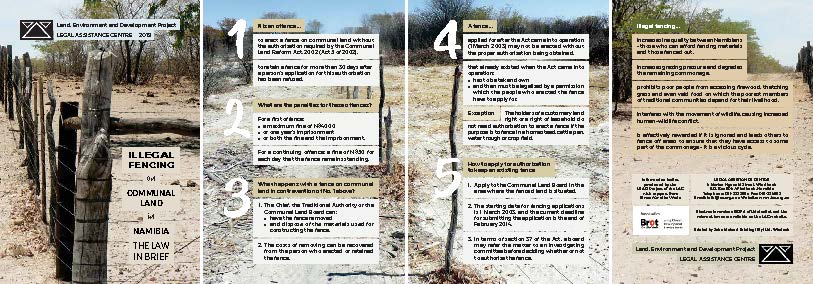
Overview
The LEAD Project was launched in 1997 in recognition of the fact that many future human rights issues in Namibia are likely to involve decisions about and competition over the ownership and development of land and other natural resources.
LEAD’s vision is therefore a Namibia, where:
- Everyone has fair and lawful access to land and natural resources;
- The environment and ecosystems are healthy and maintained and utilized in a sustainable manner; and
- All interested and affected people are empowered to participate meaningfully in their development.
LEAD promotes the rights and responsibility of all Namibians to own and access land lawfully, to utilize Namibia’s natural resources in a sustainable manner; and to live in an environment that is healthy while it participates meaningfully in its development (mission).
LEAD has the following core values:
- LEAD believes in a culture of human rights;
- LEAD promotes the values of natural justice enshrined in the Namibian Constitution;
- LEAD strives towards equality and justice for all.
When considering matters for litigation, generally the following aspects are considered by LEAD:
- Whether or not the cause is of a public interest nature and within the statutory mandate of the LAC
- Whether or not the matter involves human rights violations;
- Will the matter change legal precedents to positively impact on the greatest number or the most vulnerable people;
- does the matter concern previously and currently disadvantaged communities;
- and whether the matter has merit;
- LEAD’s work is dynamic and therefore requires flexibility and responsiveness to emerging needs.
Our main strategies include:
- Law and policy reform
- Strategic Litigation
- Legal Advice
- Advocacy
- Research
- Training and capacity building
- Networking and coordination
Following our vision, we have three areas under mandate, namely:
- Land (eg.law reform policy, illegal fencing, illegal grazing, land cases)
- Environment (e.g. wildlife crime, mining, water, pollution and waste)
- Sustainable Development (e.g. natural resource management roles, conservancies, San and other marginalised communities)
Looking back in history
The LEAD Project has been very active in all these spheres since its inception.
Building on the experience of crucial conferences like the 1991 National Land Conference and 1994 People’s Land Conference, the LEAD Project has played a vital role in the NGO Working Committee on Land Reform and has made representations to the Ministry of Lands, Resettlement & Rehabilitation (as it then was) regarding discrepancies between the National Land Policy and the then Communal Land Reform Bill – the Bill was passed by Parliament in 2002 and became law on 1 March 2003. In 2002 the Project published a report titled “One day we will all be equal” – the outcome of a two-year socio-legal research study into Namibia’s land reform and resettlement process.
At the 22nd Session of the ACP-EU Joint Assembly held in Namibia in March 1996, a resolution was passed recognizing ‘the special difficulties encountered in integrating hunting and gathering people in agricultural states’, and calling for ‘a comprehensive study of the San people in light of international conventions’.
To that end, the project conducted a research study and in 2000 published a five-volume report titled “A Regional Assessment of the San in Southern Africa” with funding from the European Union. The research report is a country-specific study of the human rights situation of the San in Botswana, South Africa, Angola, Zambia, Zimbabwe and Namibia. One volume in the series focused on gender issues concerning the San communities.
The LEAD Project has embarked on extensive information and training efforts on the new Communal Land Reform Act. Communal area conservancies, chiefs and traditional authorities, women farmers and farmers’ unions are continuously being involved in information and training workshops all over the country.
The LEAD Project, together with the Directorate of Environmental Affairs of the Ministry of Environment and Tourism and the Office of the Attorney-General, in a joint project, reviewed and redrafted Namibia’s environmental legislation.
As a result, a draft of the Environmental Management Bill was produced and submitted to government in 1998, and the drafting of an Integrated Pollution Control and Waste Management Bill was completed in 1999. Other bills into which the Project has made significant input include the Tourism Bill, Aquaculture Bill, Forestry Bill, Fisheries Bill and Environmental Investment Fund Bill.
In recent years
LEAD represented the LAC at the historic 2nd National Land Conference held on 1-5 October 2018, and gave a 15-minute presentation on “Illegal Fencing on Communal land in Namibia”.
The Project has been litigating on behalf of women and children in property rights matters, especially in terms of inheritance laws.
Much of this work is focused on women and property rights, especially under customary laws. Apart from litigation and legal advice to mainly rural women and children, the project conducts training workshops on women and property rights with women, chief and traditional authorities, staff of government departments and non-governmental organisations.
 One of the more known land and environment rights cases that the project is dealing with is the controversial ‘Epupa case’, wherein the project provides legal assistance to the communities residing around the Epupa Falls area and who would be affected by a construction of the planned Epupa/Baynes hydro-electric dam.
One of the more known land and environment rights cases that the project is dealing with is the controversial ‘Epupa case’, wherein the project provides legal assistance to the communities residing around the Epupa Falls area and who would be affected by a construction of the planned Epupa/Baynes hydro-electric dam.


